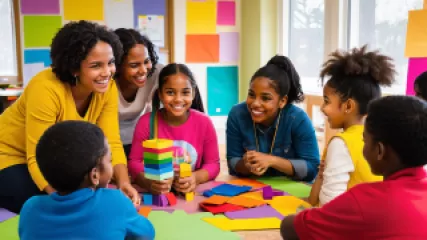Expert Insights on Childhood Resilience Workshops
Expert Insights on Childhood Resilience Workshops
Childhood resilience is a topic of great importance, as it plays a crucial role in shaping children's ability to navigate challenges and bounce back from adversity. To gain deeper insights into this subject, we had the opportunity to interview Dr. Raymond Wells, a renowned child psychologist and expert in childhood resilience. In this interview, Dr. Wells shares his expertise and provides valuable insights on the benefits of childhood resilience workshops and how they can help children build resilience.
Understanding Childhood Resilience
Resilience is the ability to adapt and recover in the face of adversity or significant life stressors. It is not something that children are born with but rather a skill that can be developed over time. Dr. Wells emphasizes that building resilience in childhood is crucial as it helps children develop the necessary tools to cope with future challenges and setbacks.
Dr. Wells: "Childhood resilience is like a muscle that needs to be exercised and strengthened. By providing children with the right support and tools, we can help them develop the skills to face life's ups and downs with resilience."
The Role of Childhood Resilience Workshops
Childhood resilience workshops are designed to provide children with a supportive environment to learn and practice resilience-building skills. These workshops typically include various activities, discussions, and exercises that aim to enhance children's emotional well-being and equip them with strategies to overcome obstacles.
Dr. Wells: "Childhood resilience workshops are an excellent way to introduce children to the concept of resilience in a fun and engaging manner. They provide a structured space where children can learn about their emotions, develop problem-solving skills, and build a support network."
By participating in these workshops, children not only gain a deeper understanding of their own emotions but also learn effective coping mechanisms and strategies to handle stress and adversity. The workshops foster a sense of empowerment and self-efficacy, enabling children to face challenges with confidence.
The Benefits of Childhood Resilience Workshops
Childhood resilience workshops offer numerous benefits for children's overall well-being and development. Here are some key advantages:
- Emotional Regulation: Resilience workshops teach children how to identify and manage their emotions effectively. By learning healthy ways to express and regulate their feelings, children are better equipped to cope with challenging situations.
- Problem-Solving Skills: These workshops encourage children to think critically and develop problem-solving skills. By exploring different solutions and approaches, children become more adaptable and resourceful in navigating obstacles.
- Healthy Coping Mechanisms: Children learn constructive ways to cope with stress and adversity, such as deep breathing exercises, mindfulness techniques, or engaging in hobbies they enjoy. These tools help children develop resilience and avoid unhealthy coping mechanisms.
- Building Support Networks: Resilience workshops provide opportunities for children to connect with peers who may be facing similar challenges. By sharing experiences and offering support to one another, children build a strong support network that can contribute to their resilience.
- Increase Self-Confidence: As children acquire new skills and successfully overcome obstacles during the workshops, their self-confidence grows. This increased self-belief equips them with the resilience to face future challenges head-on.
Nurturing Resilience Beyond Workshops
While childhood resilience workshops are valuable, Dr. Wells emphasizes the importance of fostering resilience in everyday life as well. He stresses that parents, caregivers, and educators have a vital role to play in supporting children's resilience-building journey.
Dr. Wells: "Resilience is not limited to workshops alone. It should be nurtured continuously through supportive relationships, providing opportunities for growth, and teaching children how to develop positive coping strategies in their daily lives."
Parents can help build resilience by encouraging open communication, validating their child's emotions, and promoting problem-solving skills at home. Educators can incorporate resilience-building activities into the curriculum and create a safe and inclusive classroom environment. Additionally, community organizations and mental health professionals can collaborate to provide ongoing support for children and families.
Conclusion
Childhood resilience is a crucial skill that enables children to navigate life's challenges with confidence and adaptability. Childhood resilience workshops offer valuable opportunities for children to learn and practice resilience-building skills in a supportive environment. By participating in these workshops, children gain emotional regulation techniques, problem-solving skills, healthy coping mechanisms, and a strong support network. However, it is important to remember that resilience-building should extend beyond workshops and become an integral part of everyday life. Through the combined efforts of parents, educators, and the community, we can help children develop the resilience they need to thrive.
Note: The views and opinions expressed in this article are those of Dr. Raymond Wells and do not necessarily reflect the official policies or positions of our organization.






